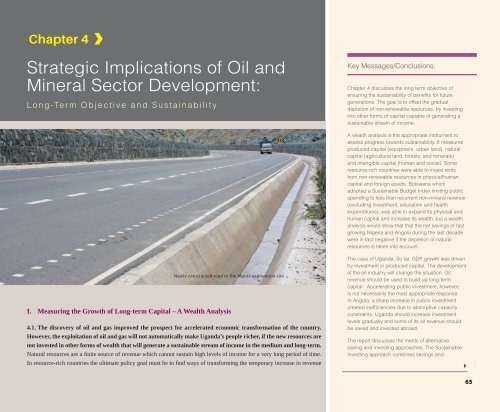Economic Diversification and Growth
71mK301zeG0
71mK301zeG0
Create successful ePaper yourself
Turn your PDF publications into a flip-book with our unique Google optimized e-Paper software.
Chapter 4<br />
Strategic Implications of Oil <strong>and</strong><br />
Mineral Sector Development:<br />
Long-Term Objective <strong>and</strong> Sustainability<br />
Key Messages/Conclusions:<br />
Chapter 4 discusses the long term objective of<br />
ensuring the sustainability of benefits for future<br />
generations. The goal is to offset the gradual<br />
depletion of non-renewable resources, by investing<br />
into other forms of capital capable of generating a<br />
sustainable stream of income.<br />
A wealth analysis is the appropriate instrument to<br />
assess progress towards sustainability. It measures<br />
produced capital (equipment, urban l<strong>and</strong>), natural<br />
capital (agricultural l<strong>and</strong>, forests, <strong>and</strong> minerals)<br />
<strong>and</strong> intangible capital (human <strong>and</strong> social). Some<br />
resource-rich countries were able to invest rents<br />
from non-renewable resources in physical/human<br />
capital <strong>and</strong> foreign assets. Botswana which<br />
adopted a Sustainable Budget Index limiting public<br />
spending to less than recurrent non-mineral revenue<br />
(excluding investment, education <strong>and</strong> health<br />
expenditures), was able to exp<strong>and</strong> its physical <strong>and</strong><br />
human capital <strong>and</strong> increase its wealth, but a wealth<br />
analysis would show that that the net savings of fast<br />
growing Nigeria <strong>and</strong> Angola during the last decade<br />
were in fact negative if the depletion of natural<br />
resources is taken into account.<br />
Newly constructed road to the Mputa exploration site<br />
I. Measuring the <strong>Growth</strong> of Long-term Capital – A Wealth Analysis<br />
4.1. The discovery of oil <strong>and</strong> gas improved the prospect for accelerated economic transformation of the country.<br />
However, the exploitation of oil <strong>and</strong> gas will not automatically make Ug<strong>and</strong>a’s people richer, if the new resources are<br />
not invested in other forms of wealth that will generate a sustainable stream of income in the medium <strong>and</strong> long-term.<br />
Natural resources are a finite source of revenue which cannot sustain high levels of income for a very long period of time.<br />
In resource-rich countries the ultimate policy goal must be to find ways of transforming the temporary increase in revenue<br />
The case of Ug<strong>and</strong>a. So far, GDP growth was driven<br />
by investment in produced capital. The development<br />
of the oil industry will change the situation. Oil<br />
revenue should be used to build up long-term<br />
capital. Accelerating public investment, however,<br />
is not necessarily the most appropriate response.<br />
In Angola, a sharp increase in public investment<br />
created inefficiencies due to absorptive capacity<br />
constraints. Ug<strong>and</strong>a should increase investment<br />
levels gradually <strong>and</strong> some of its oil revenue should<br />
be saved <strong>and</strong> invested abroad.<br />
The report discusses the merits of alternative<br />
saving <strong>and</strong> investing approaches. The Sustainable-<br />
Investing approach combines savings <strong>and</strong><br />
65


